Networking and LinkedIn
Networking is a critical part of how most people find their first jobs, especially in a competitive job market.
Take advantage of every opportunity to meet and interact with professionals in your fields of interest to extend your knowledge of preferred career fields, find out who is hiring, and get personal referrals. Start a list of your contacts — and they can be anyone you know, regardless of field. Tell them what you would like to pursue and ask if they know of anyone you could talk with related to your interests.
Here are some ways to network - in person and online!
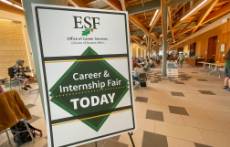
Career and Internship Fairs
Meet with regional and national employers to learn about their organizations and opportunities while gaining insight on the industry.

Departmental Networking Events
We partner with various departments and student organizations to host campus mixers and site visits.
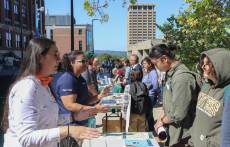
Employer Tabling and Visiting
Employers come to visit campus to meet ESF students; watch out for Career Services emails and check Handshake for more information.
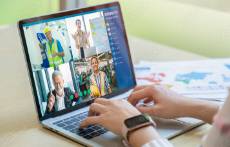
Career Development Series
Learn from industry experts and alumni, who share their professional paths career advice.
LinkedIn is an online professional network you can use to identify employers, potential contacts, alumni groups, industry affinity groups, job opportunities, and more. Think of your LinkedIn profile as your digital resume.
Check out this story for tips on how to create a great LinkedIn profile!
Taking the time to personalize your profile can make a big impact. Take a look:
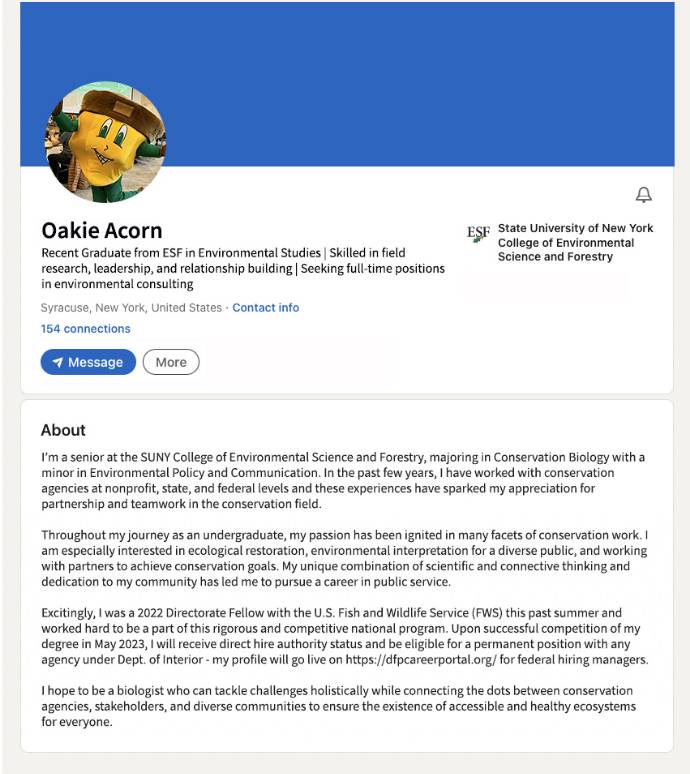
LinkedIn Alumni Search
One of the most helpful tools on LinkedIn for students is the ability to search and
explore the diverse career paths of ESF alumni. Reach out and make a connection with
someone who was or is where you want to be.
An informational interview is an opportunity for you to have a conversation with someone
working in an area of interest or organization of interest to learn more about a job,
organization, industry, or work setting. Think of it as a reverse interview! These
conversations can be had in any format, in-person, virtual, or phone.
We recommend the following steps to consider when planning for an informational interview:
- Identify who to interview: People you already know, even if they are not in specific fields or roles of interest to you, can lead you to people who are. This includes family, friends, professors, peers, colleagues, and former employers.
- Initiate contact: Contact the person by phone, email, or LinkedIn connection. Emphasize that you are
looking for information and to learn, not a role. Mention how you got their name if
from a contact.
An example of an outreach message: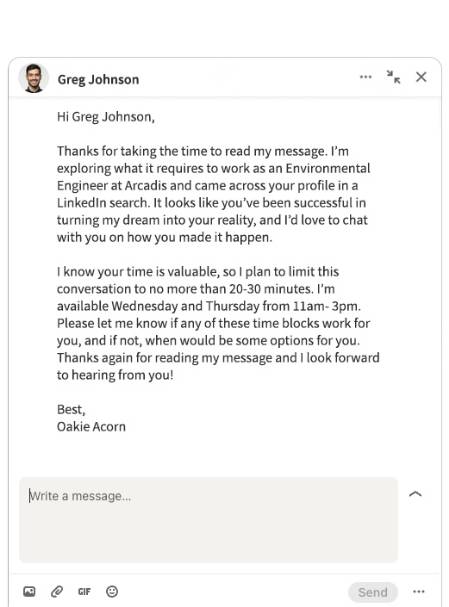
- Prepare for and conduct the interview: Develop a 30-second overview to introduce yourself (an elevator pitch), focusing on your background and the purpose of the interview. Conduct research on the organization/employer, and plan questions that are open-ended to keep the conversation going. You may think of more during the conversation and that is natural! Take notes and always ask for suggestions of other people to talk to.
Consider the TIARA Framework (revised from Steve Dalton) to help with questions:
Trends:
- Where do you see growth or change in this industry?
- What current issues and trends affect your work most?
- How do most people enter this profession?
- What qualifications are important for a new hire?
Insights:
- What are the rewards/challenges/frustrations of your work?
- Who has been the most helpful in your career and how did they help you?
- How did you get this job, and what kind of experience and preparation helped you the most?
- Could you describe a typical workday for me?
- How would you describe your company culture?
Advice:
- Other than this position, what other occupations might someone with “X” background consider?
- What are the most important characteristics or personal traits for someone entering this field?
- If you were conducting a job search today, how would you go about it?
- Can you recommend the best entry-level jobs for this line of work?
Resources:
- What organizations would you recommend joining?
- Can you recommend another person I could interview like this?
- What websites, blogs, or other resources that would be helpful for me to learn
Assignments:
- As a student, what skills and experiences should I look for to build my resume?
- Can you recommend any courses I should take before proceeding further with my job search?
- If you were me, what would you be doing right now to maximize your chance of breaking into this industry/field/function?
- Have you had interns/new graduates in the past? If so, what sort of projects have they done?
Follow-up: Keep records; write down what you learned and what you still need to learn. Send a thank you note/email within 1-2 days to express your appreciation. Mention something that you learned from the conversation that made you excited! Keep in touch! This relationship can become an important part of your professional network. Add this person on LinkedIn or even send emails from time to time with updates or further questions.
Sample thank-you note:
Hi Greg,
Thank you for taking the time to meet with me to discuss your experience with Arcadis! I learned so much from our conversation, and appreciated how you were able to articulate how your ESF experience and internships prepared you for this role. I also appreciated your insight into the trends you are seeing in environmental engineering, and how Arcadis is adapting to support their team. I look forward to updating my resume and being prepared to apply for internships this upcoming summer.
I wish you the best on your upcoming projects, and I look forward to keeping in touch with you and providing updates on my search!
Best,
Oakie Acorn
Professional Organizations
Become active in professional organizations. Start establishing contacts; volunteer your time, attend conferences, and ask about job search services or job databases that may be available to members. Some organizations even have campus chapters on campus.
Below are common examples of professional organizations for ESF students and alumni (not an exhaustive list):
- American Chemical Society (ACS)
- American Fisheries Society (AFS)
- American Institute of Chemical Engineers (AIChE)
- Association of Climate Change Officers
- Ecological Society of America (ESA)
- Engineers for a Sustainable World (ESW)
- Engineers Without Borders (EWB)
- The National Association for Environmental, Health, & Safety, and Sustainability Management (NAEM)
- North American Association for Environmental Education (NAAEE)
- NY Water Environment Association (NYWEA)
- Society of American Foresters (SAF)
- Society for Conservation Biology
- Technical Association of the Pulp and Paper Industry (TAPPI)
- US Green Building Council
- The Wildlife Society